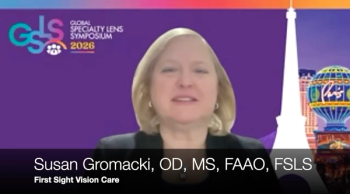
Benefit patients, benefit bottom line
Physically active patients who are looking to enhance the enjoyment of their favorite outdoor activities will test your knowledge of performance-specific sunwear.
"Performance sunwear is a rapidly changing part of our industry, and that means we need to be educated," Gibb said. "Patients have options, and it's up to us to know the right sunwear for the right activity."
Unlike fashion sunwear, performance sunwear means business: the lenses, frames, non-slip bridges, ventilation ports, and other features all function to offer comfort, protection from injury, protection from UV radiation, and to provide a competitive edge for wearers. It also means business and a competitive edge for your practice: If you establish yourself as your area's expert on the features and benefits of performance sunwear, patients will turn to you for advice and will spend their money with you accordingly.
Performance lenses-generally made from light weight and impact-resistant polycarbonate, Trivex, or NXT materials-can be offered with various lens treatments, such as photochromic, polarized, and photochromic polarized. Once again it's up to you to know the lens configurations that may work best for activities such as running, bicycling, golfing, tennis, fishing, and skiing.
Lens colors can be tailored for specific activities. Violet lenses, for example, are being marketed for their ability to make a white golf ball visually stand out against green grass.
Gibb recommended that optometrists keep a wide variety of samples in office for patients to try. Ultimately, it will be your patients' decision as to what works for them, and having a large number of samples can help ensure they make a decision they're happy with.
"There are certain lens colors that may be designed for specific activities, but inevitably it's up to the wearers to decide what they're comfortable with," Gibb said. "You can say, 'This color is designed to be the best for golf, or tennis, or cycling,' but individuals will have a preference based on their experience with the lenses.
"Violet lenses for golf are a good example. Some people like them, and some people don't. Many fisherman like polarized lenses because they tend to cut through glare off the water, but I've heard from some golfers who feel polarization makes the green harder to read," Gibb added. "So from a dispensing standpoint, you have to know what all the available options are, you have to be able to present them well and describe the advantages of each one, and ultimately you have to make samples available so patients can try them for themselves."
Gibb said she lets patients wear sample lenses outside so they can get a good understanding of what they're getting. However, she is not an advocate of letting patients buy a pair of performance sunglasses glasses and return them if they don't like them for their specific activity.
"It's part of my responsibility to give patients enough of an education upfront, and manage their expectations appropriately, that they should not end up disappointed," she said. "I think if you say, 'You can bring these back if you don't like them,' you're introducing a negative thought into the conversation and it just sets patients up not to like them."
Equip staff to discuss products
Gibb added that staff experience with the lenses is another crucial element of performance sunwear sales. Find out what activities your staff enjoys, and equip them with the performance sunwear you'd recommend to patients who have similar interests.
"You must have your staff wearing and experiencing the lenses," she said. "I hear of so many practices that don't offer free sunwear or free glasses to their staff, and I just don't understand that. You have to put your staff in a variety of lenses, so that when they're talking with a patient they can give a personal testimonial, and say, 'This feature works for me,' or, 'I've been in that situation and I prefer this.' That type of personal recommendation is huge and can really influence the buying decision."
Ultimately, Gibb concluded, your knowledge, your staff's experience, and your ability to provide demonstrators and samples will enable your most active patients to select the best performance sunwear for their needs. Help them make the proper investment, and you'll benefit in sales, patient loyalty, and referrals.
FYI
Joy L. Gibb, ABOC
Phone: 801/295-4354
E-mail:
Gibb is president of Eyes of Joy Mobile Optical Service and is a consultant for The Vision Council.
Newsletter
Want more insights like this? Subscribe to Optometry Times and get clinical pearls and practice tips delivered straight to your inbox.















































